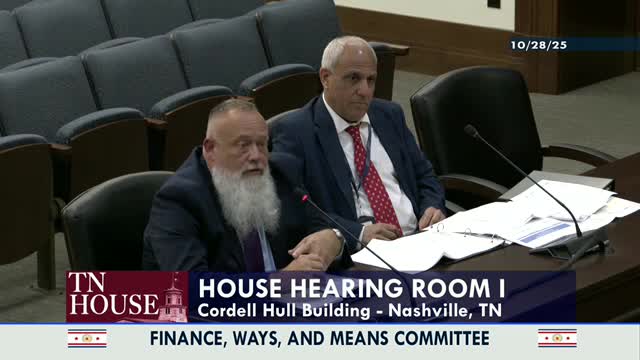Children’s Services reports fewer placement moves, lower turnover after staffing investments; privatized case managers set to expire unless funded
Get AI-powered insights, summaries, and transcripts
Subscribe
Summary
The Department of Children’s Services reported reductions in placement moves and improvements in staff vacancy and turnover rates after pay increases and other investments, but told the House Finance Committee that 90 privatized case managers supporting foster care expire in July unless recurring funding is approved.
Commissioner Margie Quinn and senior DCS officials told the House Finance, Ways and Means Committee on Oct. 28 that the department has reduced the number of placement moves for youth in state custody and has lowered staff turnover after targeted salary increases — while warning lawmakers of several near‑term capacity risks.
What the department reported - Placement stability: Quinn said placement moves per 1,000 in custody fell from 7.87 (when she took office) to 4.47, a roughly 60–70 percent improvement versus earlier baselines and slightly below the national average. Quinn described short‑term clinical assessment stays and community‑based interventions as key to the improvement. - Staffing and pay: DCS increased starting salary for case managers to $50,400 (flexing to $54,000 after one year). Quinn said vacancy and turnover rates declined after the increases; the department wants case managers carrying a target caseload of 15 (national best practice cited at 12). - Privatized case managers and a funding cliff: The department uses 90 privatized case managers to support foster care and relieve state caseloads; that contract expires in July 2026 and Quinn told the committee that without recurring funds those caseload relief positions would end and case file averages would rise. - Real estate and placement capacity: DCS said it is finalizing a real estate plan with six new trauma‑informed, home‑like short‑term facilities; Jonesboro is scheduled to break ground first, with multiple sites aimed to be shovel‑ready by 2026. The plan aims to remove youth from office settings and reduce the number of children temporarily housed in agency offices.
Questions and concerns from the committee - Case loads: Committee members asked for a current point‑in‑time caseload list; Quinn said caseload averages vary by region and program (child safety caseload averages exceed the department cap in some counties). Quinn agreed to provide the committee a dated caseload report. - Children in offices: Quinn said the wholesale practice of keeping children in agency offices ended in March 2022, but that limited instances persist when very high‑acuity or pre‑adjudicated delinquent youth cannot be placed because appropriate placements don’t exist; in those cases DCS provides education, daily hygiene, clinical support and security as needed while placement is found. - Program capacity and space: Lawmakers pressed for details about the number of programming seats and the wait list for evidence‑based programs; DCS said it has expanded educational programming via tablets (more than 1.5 million educational and religious certificates completed) and is increasing partnerships (TBR, TCAT) and virtual learning to expand capacity.
Ending note: DCS credited legislative investments for improved staffing and placement stability but emphasized the department still needs recurring funding to retain privatized case managers, complete its real estate plan, and reduce lingering reliance on office placements for very high‑acuity youth.
